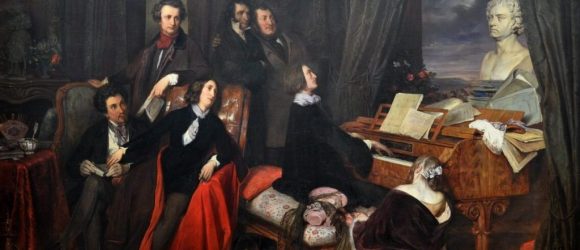Defense of the artistic research project “Historic Improvisation in the Art of Piano: Preluding, Fantasising and Extemporisation”
- 2020-12-14
- | News

On July 2, 2020, the defense of Mykolas Bazaras “Historic Improvisation in the Art of Piano: Preluding, Fantasising and Extemporisation” will take place at the Lithuanian Academy of Music and Theatre. Artistic Supervisors: Prof. Petras Geniušas, Prof. Habil. Dr. Leonidas Melnikas. Copies of the research paper and its summary are available at the library of the Lithuanian Academy of Music and Theatre (Gedimino pr. 42).
Free entrance.
Defense of the creative part of the artistic doctorate project
July 2, 2020, 10 a.m.
LMTA Building 1: Juozas Karosas Hall (Gedimino Ave. 42, Vilnius)
PROGRAM
F. Schubert – Fantasy in C major op. 15 (Wanderer Fantasy)
R. Schumann – Fantasy in C major op. 17
M. Bazaras – Improvised Preludes
CHAIRPERSON OF THE DOCTORAL THESIS DEFENCE BOARD:
Prof. Rūta Rikterė (Lithuanian Academy of Music and Theatre)
MEMBERS OF THE BOARD:
Prof. Aleksandra Žvirblytė (Lithuanian Academy of Music and Theatre)
Assoc. Prof. Sergej Okruško (Lithuanian Academy of Music and Theatre)
Prof. Dr. Lina Navickaitė-Martinelli (Lithuanian Academy of Music and Theatre)
Prof. Dr. Per Dahl (University of Stavanger)
REVIEWERS:
Assoc. Prof. Daumantas Kirilauskas
Prof. Dr. (hp) Gražina Daunoravičienė
Abstract
This study is aimed at historical improvisation in the art of piano, seeking to reveal the ways of its conception and performance. Research topic is approached by examining little known historical sources, which testify the development of improvisation in Western art music. The concept of historic improvisation is supported by analysis of nineteenth century musical practices, namely: preluding, fantasising and extemporisation. The methodology for this paper is informed by scholarly work found in nowadays ever-expanding field of improvisation.
Interpretation of the structure of improvisational musical language is represented through harmonic and textural analysis, study of galant schemes. Improvisation as a process is demonstrated by using aspects of cognitive models of spontaneous music performance. The methods and models of improvisation distilled during the research are tested in practice by the author of the work. And thus improvisation in living musical practice serves as a driving method for a case study.
The present paper offers unprecedented studies of improvisatory preludes of the nineteenth century, fantasies of the twentieth century pianists, as well it serves as a model for piano improvisation. Arguably the most popular idea that improvisation is something that is performed without preparation, happens immediately by itself, is rebuffed. The proposition is demonstrated by exposing the learning process of improvisation, and by detalising preparation act of spontaneous creation.

